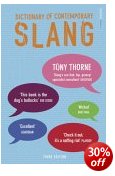street-speak, vulgar language, swearing and obscenities
It’s very difficult for dictionary compilers to keep up with the development of slang. Would you have known what chav and bling meant a year ago – in 2004 that is? But Tony Thorne’s compilation certainly captures most of the new street language that is passing into common usage as I write towards the end of 2005. Of course some of it may not last, but I have the feeling his selection is well-judged.
 He offers more than 15,000 definitions, many of the terms drawn from the worlds of drugs, sport, youth culture, and television, as well as traditional slang topics such as sex, money, and bodily functions. He also explains how and when the terms are used, with notes on nuance, tone, and associations. The language items are drawn from Britain, America, and Australia, as well as other English-speaking countries. He gives plenty of examples of usage and cites sources wherever possible.
He offers more than 15,000 definitions, many of the terms drawn from the worlds of drugs, sport, youth culture, and television, as well as traditional slang topics such as sex, money, and bodily functions. He also explains how and when the terms are used, with notes on nuance, tone, and associations. The language items are drawn from Britain, America, and Australia, as well as other English-speaking countries. He gives plenty of examples of usage and cites sources wherever possible.
He defines slang quite persuasively as “language selected for its striking informality”. And of course it’s is a loose enough term to encompass irreverence, vulgarity, new jargon, and obscenity – as well as the coded terms used by minority groups as a sort of secret language.
I was glad to see that he acknowledges one of my favourite sources of contemporary slang – Roger’s Profanisaurus – and cites it as the source for their wonderful synonym for bonkers which seems to still be in general circulation – “He’s gone completely hatstand“.
He also includes Cockney rhyming slang, which is still popular and spawning new variants all the time – although his entry on the now-disgraced Garry Glitter does not illustrate a beverage as other slang dictionaries claim, but a body part – itself a slang term. (I’ll leave you to work that one out.)
And he’s good at keeping dated slang in the lexicon. Probably not many people under forty would know that ‘gams’ is a slang term for shapely legs (on a woman of course) or that it comes from the Old Northern French term gamb – obviously itself closely related to jambe.
He’s also good at noting the mutiple possible meanings of words: fag can be a male homosexual or something you smoke. [Oops! it’s all a linguistic minefield.] So – a typical entry runs as follows, fully explaining the term:
naff adj
tasteless, inferior, shoddy, and unappealing. Naff had existed in working-class slang for at least 40 years by the time it became a vogue word in the later 1970s. It had been used in the jargon of prostitutes to mean nothing or negligible. In the theatrical, criminal and street-trading milieus it meant third-rate or poor quality. The word’s sudden popularity occurred probably because it was seized upon by TV scriptwriters (particularly Dick Clement and Ian la Frenais in the comic series Porridge) as an acceptable euphemism for fuck in such forms as ‘naff-all’ (meaning fuck-all), naffing and naff off. Naff’s ultimate origin, which seems to be 19th century, is nonetheless obscure. It has been claimed that it is a backslang form of fann(y) (in the sense of females sex organs) or an acronym or alteration of a phrase involving the word fuck (‘not a fucking fart’ or similar). Neither etymology is attested (or particularly convincing), and the similarity to NAFFI is probably coincidental-
‘To be naff is to be unstylish, whatever that may mean.’
(The Complete Naff Guide, Bryson, et al, 1983)
A lot of the examples he gives are actually US slang which is passing into UK usage, but he explains the provenance. He includes phrases as well as individual words – as in choke the chicken and smuggling peanuts.
Tony Thorne knows his stuff. There’s no slack here. The language of the street is up front. He doesn’t pretend to the sort of historical depth you get with Eric Partridge, but this is as up-to-date a dictionary of ‘strikingly informal’ contemporary language as you are likely to find.
© Roy Johnson 2007
Tony Thorne, Dictionary of Contemporary Slang, London: A and C Black, 3rd revised edition, 2006, pp.512, ISBN: 0713675292
More on language
More on literary studies
More on writing skills
More on creative writing
More on grammar